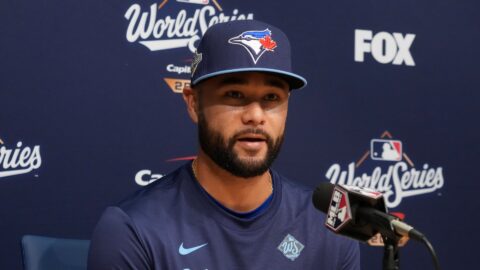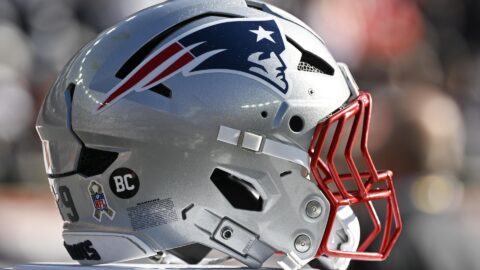The San Antonio Spurs may eventually be stopped, but they may never be slowed.
The rest of the NBA’s final four playoff contenders may want to accept that reality after the Spurs’ fast-paced victory over the Oklahoma City Thunder in Game 1 of the Western Conference Finals on Sunday night. The teams combined to put up 166 shots, 13 more than the Celtics and Sixers mustered in their Game 7 struggle on Saturday. Few teams were able to keep pace with the Spurs in the regular season, and nobody in the playoffs — literally, nobody — has yet found a way to beat them.
The Thunder at least had a chance to keep up, seeing as they had Kevin Durant, Russell Westbrook and James Harden — the league’s leading scorer, one of its leading second options and its Sixth Man of the Year, respectively — and for the most part, they did. The Thunder matched the Spurs with 83 field goal attempts and made the box score essentially a wash in both 3-pointers (San Antonio was 8-for-24; Oklahoma City was 9-for-23) and free throws (San Antonio 17-for-25; Oklahoma City 19-for-23).
When the pivotal minutes that determine champions arrived, though, the same things that delivered the Spurs four titles from 1999 to 2007 were the qualities they rode to a win on Sunday. The Spurs controlled the paint and played suffocating defense on the possessions in which their opponent absolutely, positively needed to score. Needless to say, the Thunder did not.
The picture that spoke a thousand words about Game 1 was not Manu Ginobili hop-stepping through the Thunder defense for a twisting layup or MVP candidate Tony Parker doing MVP-candidate things. The Spurs would not have won without those performances, of course. Nor would they have won without Tim Duncan‘s age-defying skills or Tiago Splitter‘s surprising second half en route to a dominating 50-26 advantage in points in the paint.
The moment that summed up the series opener came late in the fourth quarter, when Durant had the ball and the Thunder absolutely, positively needed a basket to have a chance. Durant was matched up with Stephen Jackson, and as Durant dribbled around a screen, he was met by Duncan and Parker converging. Durant had no place to go. The Thunder, who (say it again) absolutely, positively needed to score, did not.
The key to the Spurs’ success in these playoffs, which has stretched their current win streak to a franchise-record 19 games in a row, has not just been their ability to maintain their frenetic pace in the traditionally rugged postseason. The most surprising part — or the most predictable part for those who are highly familiar with the work of coach Gregg Popovich — has been how the Spurs have been similarly strong on defense.
The Spurs were almost dead-solid average on defense during the regular season, when they ranked 16th out of 30 teams in points allowed. They were better, but still stuck somewhere between average and pretty good, in the somewhat more reliable measure of defensive efficiency rating, which pegged them at 100.6 points allowed per 100 possessions. That was just out of the top third in the NBA.
Virtually no one was better on offense than San Antonio, by any measure. The Spurs trailed only the Denver Nuggets in scoring with 103.7 points per game and were first in offensive efficiency with 108.5 points scored per 100 possessions. Yet the ghosts of Phoenix Suns teams of the past and the Spurs’ own first-round bounce last year created some deserved skepticism about whether a run-and-gun team could translate its regular-season success into the playoffs.
Those questions have been answered, and loudly. The Spurs not only maintained their offensive aggression, they increased it, while their defense turned into a juggernaut. They scored more than 109 points per 100 possessions in the first two rounds and held the Utah Jazz and Los Angeles Clippers to 94.9 points per 100 possessions, a mark that would have made them the clear No. 1 defensive team during the regular season.
As many great coaches do, Popovich attacked Durant, Westbrook and Harden in Game 1 — looking not to exploit their weaknesses, but to take away their strengths.
Durant capitalizes on his unusual length on the perimeter to create shots against virtually any type of defender in space, so the Spurs forced Durant into congested areas where his long wingspan was more of a hindrance than a help. Westbrook loves his 15-foot jump shot despite his devastating first step, so the Spurs seemed to encourage him to take contested jumpers in an effort to keep him away from the rim. Harden tends to dive headlong into the lane, hoping to draw fouls or kick the ball to an open man, so the Spurs defenders simply stood in the paint and absorbed the blows from Harden’s body for charge after charge.
All of this came against the Thunder’s “offensive” lineup of Durant, Westbrook, Harden, Derek Fisher and Kendrick Perkins. Oklahoma City coach Scott Brooks sacrificed forward Serge Ibaka, the runner-up for Defensive Player of the Year, in hopes of generating more scoring against the Spurs. That group did score, with 16 points in five minutes on the court, but its offense was not nearly effective enough to overshadow shortcomings in rebounding and on defense. In order for such a lineup to work, it has to be so overwhelming on offense that those other areas become irrelevant.
Against the Spurs, offensive success can never be assumed.
That the Spurs managed to shut down two such disparate teams as the Jazz and Clippers, and are working on doing the same against another unique foe in the Thunder, shows that these new Spurs still have a lot of the old Spurs in them — when it counts.
Have a question for Ben Watanabe? Send it to him via Twitter at @BenjeeBallgame or send it here.



